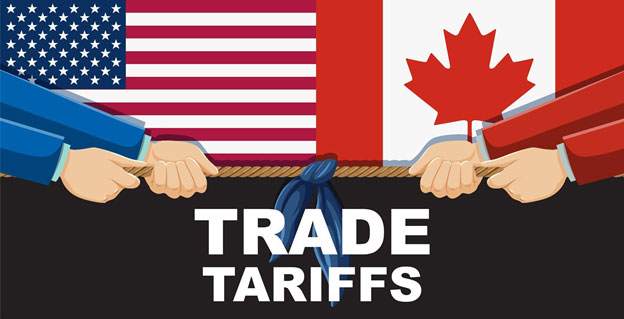The Impact of US Tariffs on Canada’s Economy
Allan Madan, CPA, CA

The ongoing trade dispute between the United States and Canada – in which leaders of both countries are imposing, or threatening to impose, tariffs on key goods – has left Canadians and business owners feeling unsettled about the economy. While the immediate impacts are evident in rising costs and uncertainty, the long-term consequences may force a fundamental restructuring of the Canadian economic landscape.

US Tariffs On Canada: The Impacts on Canadian Consumers
One of the most immediate and palpable effects of US tariffs on Canada is the increased cost of goods for Canadian consumers. As tariffs are implemented, businesses often pass these additional costs onto consumers in the form of higher prices. This can lead to inflation and erode consumer purchasing power, impacting household budgets and slowing economic growth.
The ripple effects of these trade tensions extend beyond the household goods.
The real estate market, for example, can be significantly impacted by economic uncertainty. As consumer confidence declines and economic growth slows, potential homebuyers may become hesitant to make major purchases, leading to a slowdown in the real estate market. This can have a cascading effect, impacting related industries such as construction and furniture sales.
US Tariffs On Canada: The Impacts on Canadian Businesses
The indirect impacts of US tariffs on Canada are not limited to consumer goods. The increased price of steel and aluminum, two critical inputs for numerous industries, has rippled through the global supply chain. While proponents of tariffs often argue that they are borne by the imposing country, the reality is that these price increases have a global impact, affecting businesses and consumers worldwide, including in Canada.
Small and medium-sized enterprises (SMEs) are particularly vulnerable to the impacts of these tariffs. Many SMEs rely on steel and aluminum as inputs for their products, and the increased cost of these materials can erode profit margins and threaten their viability. Additionally, businesses dependent on cross-border trade for supply chains or distribution face significant disruptions and increased costs due to border delays and heightened transportation expenses attributed to US tariffs on Canada.
The automotive industry, a cornerstone of the Canadian economy, is particularly vulnerable to these trade tensions. Given the highly integrated nature of the North American automotive supply chain, with parts crossing the border multiple times during the manufacturing process, tariffs can significantly increase production costs, making Canadian-made vehicles less competitive.
This uncertainty surrounding trade relations has created a climate of apprehension among businesses, leading many to pause investment plans and hiring initiatives. When businesses are uncertain about the future, they tend to adopt a more conservative approach, delaying expansion plans and reducing hiring, which ultimately slows economic growth.
A Looming Recession?
The cumulative impact of these factors raises the possibility of a potential recession. The global financial crisis of 2007-2008 marked the last significant recession, and historically, economic cycles suggest a downturn is overdue. For years, inflation acted as a buffer by artificially stimulating growth and postponing the inevitable correction.
However, the current tariff-induced economic upheaval presents a unique catalyst, potentially triggering the long-anticipated recession. Economic cycles are inherently prone to periods of expansion followed by contraction, which is a natural ebb and flow. This artificial inflation period caused by low interest rates and high liquidity has delayed a recession, but trade tensions caused by tariffs between the US and Canada and the resulting market instability could be the very forces that tip the scales, ushering in a new era of economic contraction.
Reduced consumer spending, coupled with business uncertainty and a slowdown in investment, can create a downward spiral, impacting employment and overall economic activity.
The Potential Upside of Tariffs
While the immediate impacts of tariffs on the US and Canada may be challenging, they also present an opportunity for Canada to re-evaluate its economic strategy. The current situation necessitates a shift towards economic diversification and a reduction in reliance on the US market.
Canada can leverage this opportunity to explore new markets, particularly in the rapidly growing Asian economies. By investing in innovation, supporting businesses in expanding their global reach, and fostering new trade relationships, Canada can build a more resilient and diversified economy.
Luckily, the Business Development Bank of Canada (BDC) has loan programs for Canadian owned businesses to deal with these challenges. The Market Xpansion Loan is designed for businesses looking to expand their domestic market or enter international markets. It covers financing for projects like market research, sales and marketing efforts, and adapting products or services for a new market. The Working Capital Loan offers financing for businesses needing capital to grow, including expansion into new markets. This loan can cover expenses associated with market expansion, such as inventory purchases, marketing costs, and employee salaries.
By embracing this challenge and proactively pursuing new market opportunities, Canadian businesses can not only weather the current storm but also emerge stronger and more competitive in the global economy.
Will Your Taxes Be Impacted?
While there are no current tax changes to be concerned about, significant economic shifts often result in government-imposed changes. The government may seek to offset reduced revenues from lower trade volumes by increasing income tax and/or corporate tax rates.
Furthermore, diminished business profitability and increased unemployment – both potentially exacerbated by US tariffs on Canada – may lead to reduced tax revenue, forcing governments to make difficult fiscal decisions that could affect everyone’s tax obligations. It’s essential for businesses and individuals to proactively plan for these potential tax changes and consult with financial professionals to navigate the evolving economic landscape.
Disclaimer
The information provided on this page is intended to provide general information. The information does not take into account your personal situation and is not intended to be used without consultation from accounting and financial professionals. Allan Madan and Madan Chartered Accountant will not be held liable for any problems that arise from the usage of the information provided on this page.



